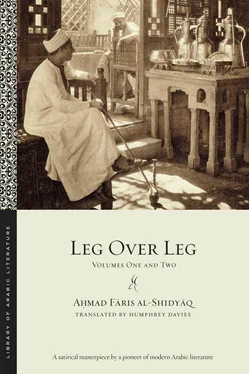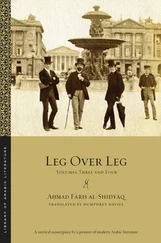The “and the like” that mockingly ends this list opens it up to parodic criticism, gesturing simultaneously toward infinite substitutability on the one hand and the impossibility of precise equivalence on the other — signaling both the mechanisms and limits of representation that will be explored throughout the text (which reaches the absurd in the secondary reading of the title, “The Turtle in the Tree”). Thus al-Shidyāq, in his display of mastery over these genres, also leads the reader through a series of generic parodies, anatomizing literary forms — interrupting his maqāmah to talk about the limitations of sajʿ (likening it to walking with a wooden leg), interrupting his protagonist’s poetry with literary-critical commentary, or (as above) disrupting the narrative episodes to discuss the conventions of the narrative discourse.
Furthermore, these interruptions, digressions, and lists create an endless leg after leg of narrative, where text seems to generate only more text. This itself points to the work’s operative hermeneutic mode: it is contiguity, not equivalence, that serves as the driving force behind meaning. It is by the juxtaposition of events, characters, and even adjectives that the plot, as nonlinear as it is, moves forward (or sideways, which is often the case). Al-Shidyāq even goes so far as to reject explicitly the very notion of equivalence, in the form of synonymity, in its opening pages. He writes:
In addition, I have imposed on the reader the condition that he not skip any of the “synonymous” words in this book of mine, many though they be (for it may happen that, on a single road, a herd of fifty words, all with the same meaning, or with two meanings that are close, may pass him by). If he cannot commit to this, I cannot permit him to peruse it and will not offer him my congratulations if he does so. I have to admit that I cannot support the idea that all “synonyms” have the same meaning, or they would have called them “equi-nyms.” (1.1.7)
As al-Shidyāq points out here, the Arabic root for “synonym,” r-d-f , does not necessarily connote equivalence. The verbs derived from it can mean to pile up in layers, to become stratified, to flock, to throng, to form a single line, or to follow one after another. Or, to put one foot after another, follow leg upon leg, as another reading of al-sāq ʿalā l-sāq allows. 63Thus does Leg over Leg , in its very title, “lay bare the device,” as Victor Shklovsky wrote of Tristram Shandy . 64
Leg over Leg , then, might be more precisely characterized as meta-generic — as al-Shidyāq seems to comment on genre more often than he writes in a generic mode. Yet his interruptions of literary convention are not only a commentary on style; they are also the foundation of his larger social and political critiques. The linguistic authority that al-Shidyāq undermines is always tied to political authority: he lampoons emirs for their misguided overconfidence in grammatical studies, satirizes Maronite priests for their hypocritical lack of scholarly goals — when staying at a monastery and in need of a dictionary to compose poetry, he inquires after a copy of the Qāmūs , Muḥammad ibn Yaʿqūb Fīrūzābādī’s lexicon, and is given answers about jāmūs and kābūs , or buffaloes and nightmares — ridicules Protestant missionaries for their inability to communicate with their congregations in their native language, and criticizes Orientalist scholars for their errors in translation (he devotes an entire appendix to correcting the errors found in the works of the French scholars he came into contact with in Paris). Yet his attacks on ecclesiastical authority should not be seen solely in light of his well-known disagreements and injuries. His position against ecclesiastical authority is more than a reaction to his brother’s treatment in Lebanon, just as his critiques of Orientalist scholarship are more than simply a reaction to his reported failure to find an academic post in Europe. 65Both are part of a sustained critique of institutionalized interpretations of sacred texts, canonical works of literature, and even social conventions — and especially of any person who blindly accepts them. Instead, al-Shidyāq subtly suggests skepticism — based on individual perception and self-improving study — as the guiding principle for spiritual enlightenment, political leadership, judicial decisions, and moral principles, as well as for scholarly research. Or, as his narrator tells us early on: “Observe, then, how people differ with regard to a single word and a single meaning!” (1.2.7) The linguistic indeterminacy that reigns in Leg over Leg —with simple definitions of words seeming to collapse under the weight of his lists of subtly differentiated synonyms — does not establish him as the ultimate linguistic authority as much as it shows that language itself is the key to dissidence. It is not a coincidence, in this sense, that his protagonist’s name also means “he who distinguishes.”
It might not be possible to tease a coherent political doctrine from his work, but al-Shidyāq expressed in his writings values that today would be associated with liberalism. He repeatedly advocated a separation of religious and political life and a respect for “personal freedoms” (so long as they are in the interest of society). Both in his travels and in his observations on life within the Ottoman Empire, he called attention to the need to improve working conditions for farmers and workers, approaching (but never wholly identifying with) some of the socialist ideas being debated in Europe during his sojourn there, chief among them the responsibility of the ruling classes toward the poor and the importance of equality under the law. 66His promotion of the value of equality, in fact, might be considered among his most radical, as he advocated for it not only among religious sects and social classes but also between genders. In Leg over Leg and elsewhere he promotes absolute equality between men and women, advocating — nearly fifty years before Qāsim Amīn’s The Liberation of Women (1899) — for the right of women to be educated. (As he explains in Al-Jawāʾib , “knowledge and education are the light of the mind… and if you cannot entrust this light to woman, then you cannot trust her with any light whatsoever, for fear that she might use it to burn down the house.”) 67Unlike many of his contemporary reformers, however, he did not write of an idealized woman whose education was in the service of a better performance of her domestic duties or the education of a new generation of children. As he writes in Leg over Leg , if one reads him in order to hear about women “possessing peculiar skills in terms of the excellent management of such household tasks as sewing, embroidery, and the like, these are mentioned in many a book and you’ll have to look them up yourselves” (2.16.72). In his book, women appear not as angels of the house but as full and equal participants in society who have a right to work as well as stay at home. “There can be no Nahḍah in the East,” al-Shidyāq is reported to have said, “without a Nahḍah of women.” 68
In Leg over Leg , written, as he claims, with so much interest in women and sympathy for them that one might believe his protagonist had been transformed into one, his interest in women’s equality is centered less on female education than on female emotional and sexual fulfillment. Through conversations with the protagonist’s wife, the Fāriyāqiyyah, al-Shidyāq decries sexual double standards, advocating for the right of women to choose their own husbands, to divorce, and to demand sexual pleasure (see Volume Three). These conversations reveal her as a witty social satirist in her own right, or, as al-Shidyāq writes in the preface, one who “argues with theorist and practitioner alike and provides excellent critiques of the political issues and conditions, mundane and spiritual, of the countries she has seen” (0.2.12). Rastegar argues for reading “the Fāriyāqiyyah” not as a name — if it were a feminization of Fāriyāq, it would be Fāriyāqah, as he points out — but as “Fāriyāq-ness,” rendered in the feminine form. 69She might thus be thought of not as a stand-in for a historical personage (al-Shidyāq’s wife, Wardah al-Ṣūlī) but as a second apparition of the self. Writing not simply about women but as if a woman , al-Shidyāq uses gender as another permutation of his thought-experiment in radical difference and belonging. And he reveals that above all, it is an experiment in subjectivity — which does not result in a definition of the self or of something one might call the modern Arab subject, but examines “the ways the self cannot be accommodated by social frameworks the world around.” 70The self, in Leg over Leg , seems always to exceed its narrative frame and multiply. As if to see himself from the inside and out, he appears as the author on the title page (“Fāris al-Shidyāq”) and as his textual doubles: the unnamed narrator (who narrates in the first person), the Fāriyāq, the Fāriyāqiyyah, and the interpolated narrator of the four maqāmāt that appear in the work.
Читать дальше












